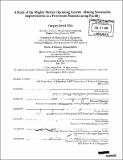| dc.contributor.advisor | H. Kent Bowen and Deborah Nightingale. | en_US |
| dc.contributor.author | Dibb, Gregory David, 1974- | en_US |
| dc.contributor.other | Leaders for Manufacturing Program. | en_US |
| dc.date.accessioned | 2006-11-08T16:38:10Z | |
| dc.date.available | 2006-11-08T16:38:10Z | |
| dc.date.copyright | 2004 | en_US |
| dc.date.issued | 2004 | en_US |
| dc.identifier.uri | http://hdl.handle.net/1721.1/34787 | |
| dc.description | Thesis (M.B.A.)--Massachusetts Institute of Technology, Sloan School of Management; and, (S.M.)--Massachusetts Institute of Technology, Dept. of Mechanical Engineering; in conjunction with the Leaders for Manufacturing Program at MIT, 2004. | en_US |
| dc.description | Includes bibliographical references (p. 133-134). | en_US |
| dc.description.abstract | Many manufacturing companies are developing their own production or operating system, particularly in an effort to duplicate the widely renowned Toyota Production System. Toyota has demonstrated its potential for improving productivity and profitability. These same opportunities exist in nearly all companies, manufacturing or otherwise. This thesis explores the application of a similar operating system for a powertrain manufacturing company referred to as the Mighty Motors Company. More specifically, this thesis seeks to discover and explain Mighty Motors' obstacles to making sustainable improvements on the factory floor. The conclusions of this thesis are based primarily on the author's firsthand observations at Mighty Motors' powertrain manufacturing facilities. These data include quotes from interviews, results from factory floor experiments, and observations from improvement projects on the factory floor. The data are then sorted into five categories of observations, which serve as the basis for final recommendations. These five recommendations are suggested as a course of action to overcome the obstacles to making sustainable improvements on the factory floor at Mighty Motors: 1. Go to the floor to make firsthand observations. The best quality data regarding a problem or opportunity on the factory floor is obtained by going to the site in question on the factory floor. 2. Standardize all activities (by making them highly specified according content, sequence, timing, and outcome). 3. Standardizing activities in this way improves the visibility of problems and provides a common basis for improvement. 3. Standardize each link to create one clear, direct, unambiguous signal. Standardizing links (connections) | en_US |
| dc.description.abstract | (cont.) between activities eliminates ambiguity and waste. 4. Solve every problem and make every improvement in accordance with the A3 and the scientific method. Following this scientific approach on the factory floor increases the rate of learning about and improving the processes. 5. Provide sufficient support to the operators by way of a robust help chain. Constant support is required to sustain processes and improvements on the factory floor. These conclusions are then consolidated with the previous models of the Mighty Motors Operating System to provide one unified model for making sustainable improvements on the factory floor at Mighty Motors. | en_US |
| dc.description.statementofresponsibility | by Gregory David Dibb. | en_US |
| dc.format.extent | 134 p. | en_US |
| dc.format.extent | 7869959 bytes | |
| dc.format.extent | 7869767 bytes | |
| dc.format.mimetype | application/pdf | |
| dc.format.mimetype | application/pdf | |
| dc.language.iso | eng | en_US |
| dc.publisher | Massachusetts Institute of Technology | en_US |
| dc.rights | M.I.T. theses are protected by copyright. They may be viewed from this source for any purpose, but reproduction or distribution in any format is prohibited without written permission. See provided URL for inquiries about permission. | en_US |
| dc.rights.uri | http://dspace.mit.edu/handle/1721.1/7582 | |
| dc.subject | Sloan School of Management. | en_US |
| dc.subject | Mechanical Engineering. | en_US |
| dc.subject | Leaders for Manufacturing Program. | en_US |
| dc.title | A study of the Mighty Motors operating system : making sustainable improvements at a powertrain manufacturing facility | en_US |
| dc.type | Thesis | en_US |
| dc.description.degree | S.M. | en_US |
| dc.description.degree | M.B.A. | en_US |
| dc.contributor.department | Leaders for Manufacturing Program at MIT | en_US |
| dc.contributor.department | Massachusetts Institute of Technology. Department of Mechanical Engineering | |
| dc.contributor.department | Sloan School of Management | |
| dc.identifier.oclc | 56769141 | en_US |
